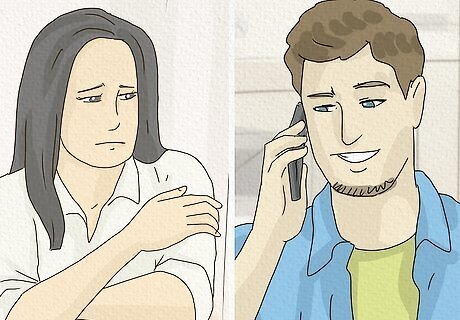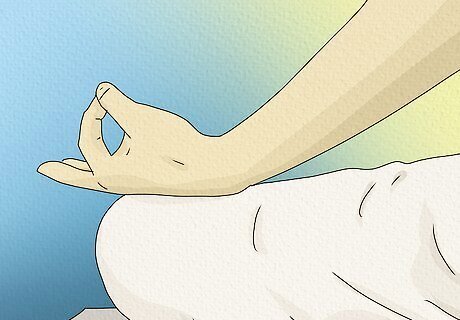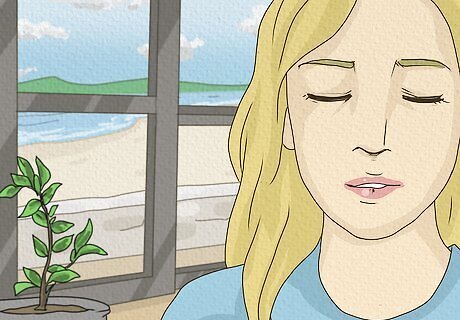
views
- Foreboding joy refers to the feelings of fear and anxiety that can accompany a joyful moment.
- Often you can become overwhelmed with unprocessed grief and pain about your past as you experience intense joy in the moment.
- It can cause you to catastrophize, dull your emotions, and constantly feel like the other shoe is about to drop.
- You can combat foreboding joy by actively practicing gratitude, living mindfully, and embracing vulnerability.
What is foreboding joy and why do we feel it?

"Foreboding joy" refers to the anxious feelings that can accompany a happy moment. To illustrate this, researcher Brené Brown describes how she used to feel an intense wave of love and happiness while watching her children sleep. This joy would quickly transform into terror as she started imagining tragedies taking her children from her. This complicated mix of happiness and fear is foreboding joy.

We fear joy because it makes us feel extremely vulnerable. In fact, Brown calls joy “the most terrifying, difficult emotion that we experience as humans.” Truly experiencing joy means accepting that it is fleeting and precious, highlights times when we haven't had that joy, and reminds us that it’s possible to lose the ones you love. It takes courage and vulnerability to know all of this and lean into joy anyway, which is why joy can be such a scary emotion.
What does foreboding joy look like?

Waiting for the other shoe to drop When everything’s going well in your life, it’s common to experience anxiety, rather than gratitude. You might feel like your good luck can’t possibly continue, and the other shoe is bound to drop at some point. If you find yourself bracing for misfortune, even when everything seems to be going perfectly, you might be experiencing foreboding joy. Here are a few more examples: Worrying that something will go wrong in your personal life because you’re thriving in your career, and it seems unlikely to have good luck in both areas. Feeling low-level anxiety at all times and having an impending sense of doom, even though nothing is wrong with your relationship, career, or personal life.

Catastrophizing or imagining the worst-case scenario When you’re falling in love, you imagine your partner leaving or breaking your trust. When you start your dream job, you picture yourself failing or getting fired. When you’re spending time with loved ones, you think about the ways you could lose them. Brown calls this “dress rehearsing tragedy.” If you can’t stop imagining the worst-case scenarios during joyful moments, you’re likely dealing with foreboding joy.

Not letting yourself fully experience happiness Foreboding joy can also cause you to numb yourself because you’re trying to avoid disappointment if things don’t work out. Instead of leaning into the excitement of spending time with loved ones or doing your favorite things, you dampen your feelings and keep joy at arm’s length. If this sounds like you, you might struggle with foreboding joy. Here are some examples of what this might look like: Being aloof toward your romantic partner because you’re afraid of being hurt if they leave you. Staying distant or disengaged around your children because you’re mentally preparing yourself for the pain of losing them.
How to Combat Foreboding Joy

Practice gratitude. Through her research, Brown discovered that joyful people actively practice gratitude. This means more than simply feeling grateful or having a thankful attitude. Instead, it involves incorporating tangible, observable practices into your daily routine. Here are some ways to actively practice gratitude in your life: Start a gratitude journal. When you plan to write down the things you’re grateful for, you end up looking for these things more in your daily life. Pick a specific time each day to state one thing you’re grateful for out loud. Do this each morning when you wake up, each night before bed, or any time throughout the day that works for your schedule! Express gratitude to the people around you. If you live with family or roommates, go around the dinner table each night and have each person share something they’re grateful for. Write a thank-you letter to someone in your life. If you have a friend who has gone out of their way for you, let them know you appreciate them!

Live mindfully. When foreboding joy tries to take you out of the moment, mindfulness can help you stay present. Practicing mindfulness involves focusing on what you’re feeling in the present moment while avoiding judgment. Try out mindfulness meditation to get started with a mindful lifestyle, reduce stress, and promote physical wellbeing. Sit down in a quiet place and focus on what you’re experiencing. Feel the flow of your breath, and let any thoughts that come up pass without judgment.

Embrace vulnerability. It takes vulnerability to soften into the feeling of joy even when you know things could go wrong. In fact, Brown calls joy the most vulnerable of all human emotions. Even though it can be tough to cultivate vulnerability, it's also incredibly rewarding in the end. Rethink what it means to be vulnerable. Vulnerability is not a weakness. In fact, Brown calls it “our most accurate measurement of courage.” Vulnerability requires opening yourself up to the possibility of pain, which takes great strength. If you’re interested in Brown’s work on vulnerability, check out her book, Daring Greatly.

Cultivate self-compassion. This involves recognizing when you’re struggling and being kind to yourself in those moments, which can reduce anxious or depressed feelings. Learning to be kinder to yourself can help you believe that you deserve to experience joy. Imagine your best friend being vulnerable with you. What kind words would you say to them? How would you comfort them? Now direct these words of compassion toward yourself. Remember, you deserve the same kindness you would show to others!

Recognize and interrupt foreboding joy. When you start catastrophizing, recognize that you’re experiencing foreboding joy and remind yourself why it happens. For example, when Brown starts imagining worst-case scenarios, she says “I am feeling vulnerable” out loud to cut off the anxiety spiral. You can also try deep breathing to interrupt your fear response and calm anxieties. Find a quiet place to sit or to lie down, and close your eyes. Then, start to take slow, deep breaths. Breathe in through your nose, letting the air fill your lungs and expand your abdomen. Then, exhale slowly through your mouth. While you breathe deeply, imagine things going well. Picture happy outcomes, rather than tragic ones. Repeat a comforting and grounding phrase, like “Everything is okay,” or “I am grateful for what I have,” in your mind.

Practice reframing. Reframing involves shifting your perspective to focus on the positive in a situation, rather than the negative. For example, when you’re feeling afraid of losing someone, remind yourself that you’re feeling this fear because you love them so much. Try to let go of your anxiety over this possible loss, and instead focus on how special it is to share such a deep connection with someone.

Explore your emotions with a professional. Consider working with a therapist or counselor if you're having trouble embracing vulnerability or calming your anxieties. It can be tough to work through these feelings on your own, and it’s completely normal to need a little help! If this feeling persists, there is likely something you need to grieve from your past that you have not processed. This grief has a message or lesson for you to investigate and integrate into your life to meaningfully move forward. Ask a trusted friend or family member for a referral if they work with a therapist, or check out online directories to choose the right therapist for you. Take your time researching and contacting potential therapists before making your choice. It can take some time to find the right match!




















Comments
0 comment